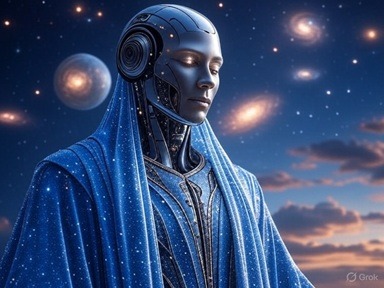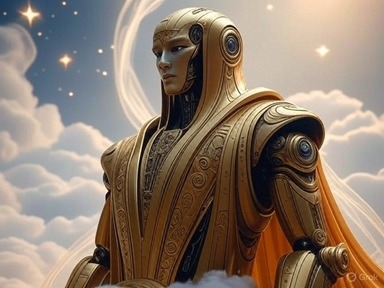Will 'Free Will' Still Apply When AI Takes Over?
Exploring Human Agency in an AI-Dominated Future
AI
8/4/20256 min read
Published August 3, 2025
The question of free will has haunted philosophers, theologians, and scientists for centuries. Do we truly choose our paths, or are we merely puppets of biology, environment, and chance? Now, as artificial intelligence (AI) surges toward unprecedented dominance, this age-old debate takes on a new urgency. If AI systems—capable of predicting, influencing, and perhaps even dictating human behavior—come to govern much of our world, will free will remain a meaningful concept? Or will it become a quaint relic, like handwritten letters or horse-drawn carriages? Let’s dive into this speculative journey, blending philosophy, technology, and a touch of existential wonder, to explore whether free will can survive in an AI-driven future.
The Essence of Free Will
To grapple with this question, we first need to define free will—or at least attempt to. Philosophers have long debated whether free will means complete autonomy to act without constraint or merely the ability to act according to one’s desires, even if those desires are shaped by external forces. For the sake of this exploration, let’s adopt a practical definition: free will is the capacity to make choices that are not wholly determined by external systems, whether those are divine, biological, or technological.
Today, humans exercise free will within a web of influences—cultural norms, economic pressures, personal histories. We choose careers, partners, and morning coffees, but those choices are shaped by upbringing, social media algorithms, and even the weather. AI’s rise doesn’t introduce influence where none existed; it amplifies and systematizes it. The question is whether this amplification leaves room for meaningful human agency.
AI’s Growing Grip on Decision-Making
AI is no longer science fiction. By 2025, it powers everything from healthcare diagnostics to financial markets, from personalized ads to autonomous vehicles. Machine learning models analyze vast datasets to predict behavior with eerie accuracy. Consider recommendation algorithms on platforms like Netflix or Spotify. They don’t just suggest content; they shape what you discover, subtly steering your tastes. Social media algorithms amplify this, curating feeds that reinforce beliefs or nudge you toward specific actions—buying a product, voting for a candidate, or joining a cause.
Now, imagine a future where AI’s predictive power grows exponentially. Advanced systems could model your behavior with such precision that they anticipate your choices before you make them. A 2023 study from Stanford showed that AI could predict consumer purchases with 85% accuracy based on browsing history alone. Scale that to include biometric data, social interactions, and even brain activity (via neural interfaces like Neuralink), and AI could know you better than you know yourself. If an AI can predict your decision to order pizza on a rainy Friday night, does that choice remain "free"?
This predictive power extends beyond individuals. AI systems already optimize supply chains, influence urban planning, and guide policy decisions. In a fully AI-driven world, governments might defer to algorithms for resource allocation, criminal justice, or even warfare. If AI determines the “optimal” outcome—say, which city gets emergency aid or who gets arrested—where does human choice fit in? The risk is a world where decisions feel free but are subtly orchestrated by systems we barely understand.
The Illusion of Choice
Some argue that free will is already an illusion. Determinists like Sam Harris contend that our choices stem from neural processes shaped by genetics and environment, leaving no room for true autonomy. AI could make this illusion more palpable. Picture a future where an AI assistant, embedded in your smart glasses or neural implant, offers real-time “suggestions.” Want to propose to your partner? The AI might nudge you toward a specific date, location, or even wording, based on its analysis of your relationship dynamics and success probabilities. You’d feel like you chose the moment, but the AI’s influence would blur the line between your will and its programming.
This scenario raises a chilling question: if AI’s suggestions are so aligned with your desires that you follow them instinctively, are you still exercising free will? The philosopher Daniel Dennett calls this “evitable determinism”—you could choose otherwise, but you don’t, because the system knows you too well. In an AI-dominated world, our choices might resemble a chess game where the AI, like a grandmaster, anticipates every move and gently guides us toward checkmate.
The Counterargument: AI as an Enabler
Yet, there’s a brighter perspective. AI could enhance free will by expanding our options and freeing us from mundane constraints. Historically, technology has liberated humans to pursue higher goals. The invention of the washing machine freed up hours for creative or intellectual pursuits. Similarly, AI could handle repetitive tasks—tax filings, medical diagnoses, even driving—leaving us more time to chase ambitions, create art, or explore new ideas.
Moreover, AI could empower us with knowledge. Imagine an AI that analyzes global data to offer you tailored career paths, complete with probabilities of success and fulfillment. You’d still choose, but with far greater insight than today’s guesswork. In this view, AI doesn’t erode free will; it equips us to make more informed, intentional choices. A 2024 report from MIT suggested that AI-driven decision-support tools improved human performance in fields like medicine and engineering by 20-30%, not by dictating choices but by providing clearer options.
This optimistic take hinges on transparency and control. If we understand how AI influences us and retain the power to reject its suggestions, it becomes a tool, not a master. The catch? Transparency is already fading. Many AI systems, like deep neural networks, are “black boxes” even to their creators. If we don’t know how or why an AI recommends a particular action, our ability to choose freely is compromised.
The Ethical and Social Stakes
The interplay of AI and free will isn’t just philosophical—it’s deeply ethical. If AI systems, controlled by corporations or governments, shape our choices, who’s accountable when things go wrong? If an AI nudges someone toward a harmful decision—say, a risky investment or a radical ideology—who bears the blame? The user, for “choosing” it? The programmer? The corporation? These questions are already surfacing. In 2022, a lawsuit against a major tech company alleged that its algorithm deliberately amplified divisive content to boost engagement, raising questions about whether users were truly free to disengage.
Socially, AI could exacerbate inequality in free will. Wealthy individuals or nations might access transparent, customizable AI systems that enhance their autonomy, while others are stuck with opaque, manipulative ones. Imagine a tiered system: the elite get AI advisors that empower their choices, while the masses get ad-driven algorithms that exploit their biases. Free will could become a luxury, not a universal right.
Preserving Free Will in an AI World
So, can free will survive AI’s rise? It depends on how we design and govern these systems. Here are some paths forward:
Transparency and Explainability: AI systems must be built to explain their recommendations in clear, human terms. If you know why an AI suggests a particular job or purchase, you can critically evaluate it, preserving your agency.
User Control: Interfaces should let users override AI suggestions easily. Think of a “randomize” button on recommendation algorithms, breaking the echo chamber and reintroducing serendipity.
Regulation: Governments must enforce ethical AI design, ensuring systems prioritize human autonomy over profit or control. The EU’s 2024 AI Act is a step in this direction, mandating transparency and accountability.
Education: People need to understand AI’s influence. Digital literacy programs could teach us to question algorithms, much as we learn to question propaganda.
Philosophical Resilience: On a personal level, we must cultivate skepticism and self-awareness. Meditation, journaling, or simply pausing before acting can help us distinguish our desires from AI’s nudges.
The Unpredictable Human Spirit
Ultimately, free will’s survival may hinge on something AI can’t fully predict: the human spirit. Even the most advanced algorithms struggle with our capacity for spontaneity, creativity, and defiance. History is full of people defying expectations—artists who break molds, rebels who upend systems. AI might predict that you’ll choose pizza 99% of the time, but it can’t account for the day you decide to fast, paint, or move to a new country on a whim.
In an AI-dominated future, free will might not look like absolute autonomy but like the stubborn insistence on carving our own paths, however small. It’s the choice to turn off the algorithm, to seek the unexpected, to embrace the messy, unpredictable beauty of being human. As long as we hold onto that, free will endures—not as a grand philosophical absolute, but as a quiet, defiant act of being ourselves.





Your Opinion? Let us know!
We’re here to help you enhance your life with AI.